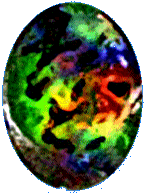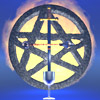Black
Opal :: Sydney Gnostic Meetup
This is the website for information on the Sydney Gnostic
Meetup group (see http://gnostic.meetup.com/32 for
details and to join).
I am no longer the organiser for this or any other group through the Meetup website, as Meetup has started charging for their services. I am still glad to discuss and meet with open-minded individuals and groups, and I am looking at the possibility of setting up a messageboard and other services for this purpose through my own website - and therefore to remain FREE. Feel free to contact me (email address at bottom of page) or check back here for more information later.
Please check my section on Gnosticism (link at top of page) for essays, stories, and other information on Gnosticism, and the rest of my Black Opal website for other topics that may be of interest.
This is a discussion group for
all those interested in gnosticism, whether you have long experience and deep knowledge, or are an interested
newcomer to gnosticism, you can feel free to discuss any relevent topics here.
Discussions can be led into new topics, book readings, meditations, or whatever
else the group is interested in. Experiment and experience is encouraged,
as is an open mind, and a balance of reason/rationality/logic and intuition.
Interested people would most likely
be:
·
Scholars of historical gnosticism
·
People interested in gnostic texts (Nag Hammadi, apocryphal
biblical texts, other books and texts from other traditions)
·
Those interested in Sufism and other mystical traditions
from around the world
·
Thelemic/New Aeon gnostics
·
Shamans & other exponents of experiential traditions
These and other relevent topics
will be explored in an informal and friendly environment, and the focus can
be directed as group members feel the need.
The Sydney Gnostic Meetup group meets on the second
Friday of the month at 7:30pm.
NEXT
SYDNEY GNOSTIC MEETUP: MAY 13TH 2005 – 7:30PM
The
topic of discussion will be the Gnostic Hymn of the Pearl (photocopies of
2 versions available), and if everyone present feels like it we shall watch
a gnostically inspired video (yet to be decided) and perhaps order pizza!
FOLLOWING SYDNEY GNOSTIC MEETUP: JUNE 10TH
2005 – 7:30PM
The
topic of discussion has not yet been decided – perhaps simply an open
discussion of whatever is on out minds. Then if everyone present feels like
it we shall watch a gnostically inspired video (yet to be decided) and perhaps
order pizza!
What
is gnosticism?
Gnosticism can be
difficult to define because it is a cross-cultural phenomenon. The word "Gnosis"
comes from the same Greek root word as the English word "knowledge"
and "Gnosis" carries the concept of "knowing", especially
the wisdom or knowledge that comes from direct, personal experience, as opposed
to knowledge from strictly rational, intellectual pursuits (book knowledge).
Gnosticism is also fundamentally different to (some would say diametrically
opposite to) the more widespread forms of spirituality that rely on an unquestioning
acceptance (faith) of a set of beliefs handed down from a mediator (prophet,
priest, etc) between humankind and the divine. So, rather than through faith
or belief, gnostics seek personal experience and firsthand knowledge, of the
divine. This experience, or "gnosis" can come about through various
means, but all have the same goal.
Through the ages
and around the world gnosticism has taken many different forms. Most people
in western countries will be familiar with the classical Gnosticism that grew
out of certain Jewish mystic communities (such as the Essenes of the Dead
Sea Scrolls fame), Greek philosophy, Hermeticism, & which came to influence
and include early Christian theology as well. There is lot of circumstantial
evidence, in fact, that Christianity was originally a loose coalition of Gnostic
communities until the Council of Nicea in 325ad. After this date, although
periodically suppressed in ruthless crusades, Christian forms of Gnosticism
managed to survive in pockets right through the middle ages and into the Renaissance,
with a resurgence in the eighteenth and more particularly the nineteenth centuries
(along with other forms of esoterism such as Spiritualism, Hermeticism, etc).
Buddhism is essentially Gnostic in character, and in the Islamic world Gnosticism
is most easily recognised in the Sufi tradition which has survived and thrives
right through till today. It can also be recognised in the shamanic practices
of many cultures around the world.
These are all very
different to one another (some more similar to others), and their methods
and teachings may vary quite a bit: from quiet meditation and prayer; healing
and the laying on of hands; group debate; solitary contemplation; to ecstatic
dancing; chanting, singing and more. This is one of the reasons why Gnosticism
is so difficult for people to pin down.
So what are the threads
that run through each of these forms of Gnosticism, that makes them essentially
Gnostic?
Essentials (common
to all forms of gnosticism): Humanity is essentially divine in nature, but
unaware of, or asleep, or otherwise out of touch with the divine source; Our
divine nature is contained within us as a spirit spark, so that the divine
is both within and without; The main goal is to achieve union with this divine
source; This goal can be achieved through individual revelation and direct,
personal knowledge, by whatever methods are open to you.
Commonalities (not
necessarily apparent in all forms of Gnosticism, but common to a lot: Tolerance
of different beliefs, both within & without Gnosticism (usually due to
an openness to truth & wisdom wherever it may be found); the balance of
feminine & masculine energies in all things including the divine (&
therefore, to unite this duality is to achieve Gnosis); some teach a less
balanced duality, where the world of matter is evil and that of spirit is
good.
© Lynette F. Watters 1997-2005
To contact me, my email address is "lunetta777" followed by "@bigpond.com",
less the quotation marks (of course)


